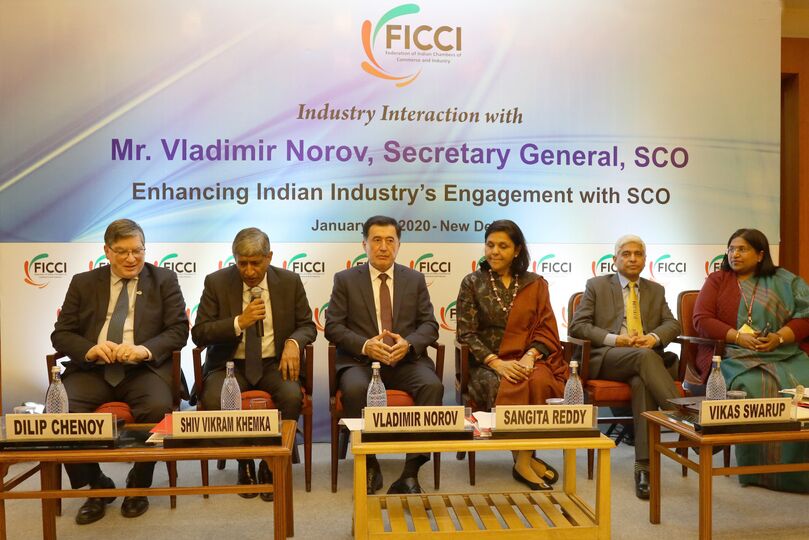On 13 January 2020, SCO Secretary-General Vladimir Norov had a meeting in New Delhi with delegates from the Federation of Indian Chambers of Commerce and Industry (FICCI).
The event was attended by over 100 delegates of the FICCI, one of India's largest and oldest business organisations, the heads of major companies, Indian business people and entrepreneurs, as well as representatives of foreign countries' diplomatic missions in New Delhi.
Opening remarks were delivered by FICCI President Sangita Reddy, Deputy Foreign Minister of India Vikas Swarup, Chair of the National Chapter of India at the SCO Business Council Shiv Vikram Khemka, as well as the ambassadors of Kazakhstan, Kyrgyzstan and Tajikistan to the Republic of India.
Vladimir Norov, who was the keynote speaker at the event, noted that the SCO was a major contributor to the development of international trade, promoting a favourable investment and business climate and supporting business initiatives.
He pointed out that India's accession to the SCO as a full member opened up new opportunities for the further strengthening of comprehensive cooperation. "India's combined trade with SCO countries increased by 21 percent in 2017 and 15 percent in 2018 compared to 2016," the SCO Secretary-General said.
Vladimir Norov recounted the mechanisms created at the initiative of the SCO countries' leaders, such as the Business Council, the Interbank Association and the Regional Heads' Forum, as well as the SCO documents adopted to promote a comprehensive and balanced development of the SCO member states based on transparent, predictable and stable conditions.
He urged the Indian financial and economic circles to actively take advantage of these bodies and documents.
The SCO Secretary-General updated those taking part in the event about the SCO events to be held in India this year within the framework of its Presidency of the SCO Heads of Government Council, including the council's meeting and the gatherings of the SCO states' ministers in charge of foreign trade and economic cooperation, national coordinators and financial experts, as well as the first meeting of the Consortium of SCO Economic Analysis Centres.
To ensure the top-level organisation of the consortium's meeting, this SCO agency will be chaired by the head of the economic analysis centre of the host country, as stipulated in its regulations. Vladimir Norov asked the Indian side to notify the other sides which economic analysis centre would be responsible for the meeting and also to send them a draft of the consortium's action plan for the year.
He cited the tradition of holding business forums ahead of the SCO Heads of Government Council meetings in order to develop direct ties between business people and invited FICCI delegates to consider the possibility of holding such a forum in India in the autumn.
The SCO Secretary-General also spoke about innovative economy and e-commerce, which have greatly changed trade and economic interaction and people's lives, as well as influenced the global economic structure. He added that experts assessed the share of the digital economy in global trade at some 20 percent and expected it to increase to 25 percent by 2025.
According to Vladimir Norov, the accelerated development of global e-commerce not only stimulates enterprise but also facilitates the settlement of many socioeconomic problems, in particular, by creating a vast number of new jobs, which is especially important for women, young people, senior citizens and people with disabilities, and thereby becoming an effective instrument for overcoming poverty.
"The increasing digital divide between the industrialised and the least developed countries, which is not a positive trend, is increasing the developing countries' disadvantages. Therefore, we believe that the time has come for taking purposeful and active measures to develop e-commerce in our countries," Vladimir Norov emphasised.
The SCO Secretary-General also mentioned the need to boost the SCO countries' interaction in transport, logistics and regional tourism. He invited Indian business circles to contribute to the multilateral SCO cooperation in these fields.
Deputy Foreign Minister of India Vikas Swarup spoke about the contribution to security and stability in the region made by the SCO over the past 20 years thanks to the member states' striving to strengthen regional cooperation in order to turn a potential Eurasian arc of instability into an oasis of regional stability and cooperation.
He proposed using India's advantages to boost the SCO's cooperation in the fields of pharmaceutics, healthcare, green technology, energy, biofuels, infrastructure construction, as well as disaster management, education and culture, which have been developing especially rapidly in India.
FICCI President Sangita Reddy informed those taking part in the event about the federation's goals and tasks, history and role in upholding the interests of business circles and in developing and strengthening ties with foreign business communities and international business organisations.
Shiv Vikram Khemka, Chair of the National Chapter of India at the SCO Business Council, pointed out the importance of lifting restrictions to the development of trade between the SCO countries and creating favourable conditions for enhancing the attraction of SCO Family tourism destinations.
At the close of the event, the ambassadors of Kazakhstan, Kyrgyzstan and Tajikistan noted the importance of dialogue between the SCO business circles for boosting trade and economic cooperation, as well as the vital role the SCO plays in this process.
Established in 1927, FICCI is the largest and oldest apex business organisation in India drawing its strength from diverse regional chambers of commerce and industry across states and reaching out to over 250,000 companies. The history of the federation is directly connected with India's industrialisation and establishment as one of the most rapidly growing economies in the world.
The National Chapter of India at the SCO Business Council has been represented by the diversified SUN Group since 2017.
